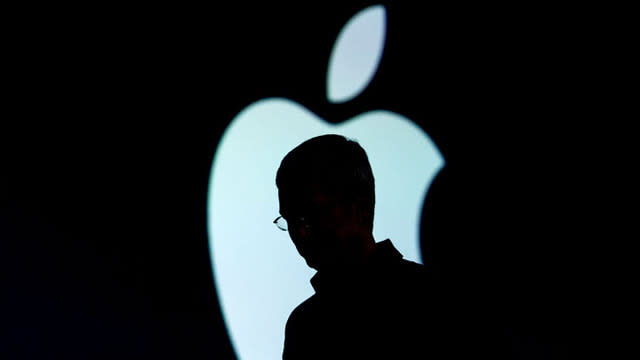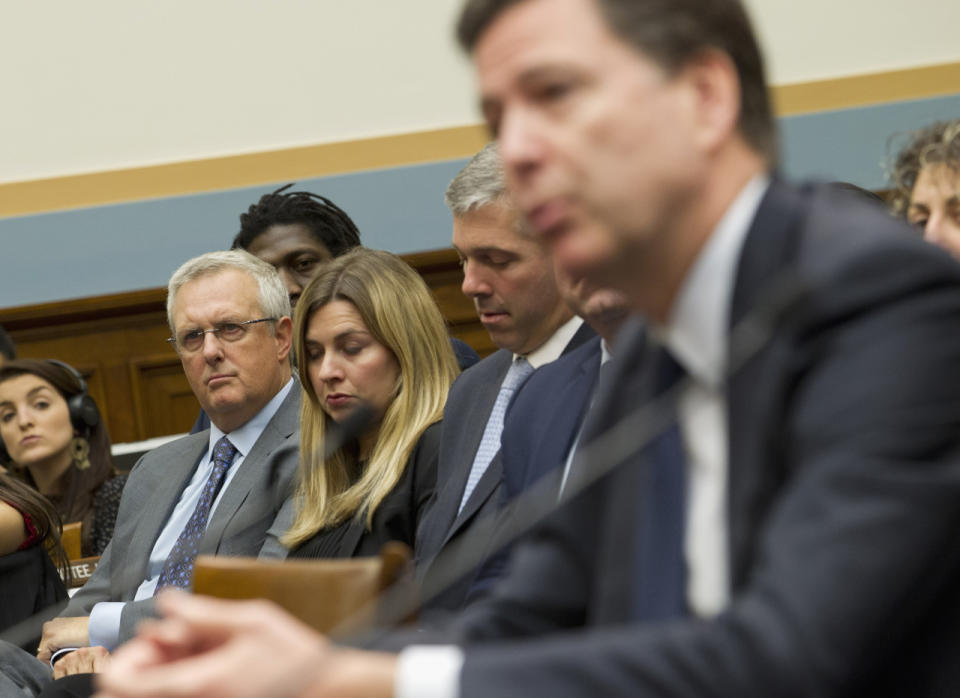Tech and civil rights groups rally behind Apple in court filings

(Photo: Bloomberg Video).
Privacy advocates, legal and computer security experts, and over 30 major tech companies filed briefs with a California court on Thursday asking it to dismiss the FBI order that would force Apple to help unlock the phone used by one of the San Bernardino shooters. Support came from a wide range of individuals, including a United Nations human rights official and Salihin Kondoker, the husband of a surviving victim of the December shooting.
The “friend of the court” submissions are the latest development in a saga pitting Apple against the FBI over the bureau’s attempts to unlock a San Bernardino shooter’s iPhone. The FBI’s position has drawn support from law enforcement leaders, sharp scrutiny from Congress and outrage from privacy activists.
Related: Apple v. FBI: Examining the slippery slope argument
Never a company to bypass a good public relations opportunity, Apple created a website to aggregate amicus briefs and letters to the court submitted in its favor, circumventing the court’s sometimes slow digital processing system.
Most prominent among Apple’s supporters was a joint filing from 15 Silicon Valley giants, including Amazon, Google, Microsoft, and Facebook. In a brief that voiced concerns about government overreach and the failure to consult Congress, the companies argued that a decision against Apple threatens the very nature of their products.
SLIDESHOW – Shooting in San Bernardino, California >>>
“How apps and programs store data is not just—as the government claims—a “public brand marketing strategy.” It is at the core of the products’ identities,” the statement, embedded below, reads. “Indeed, how companies store and manage customers’ data is one way companies tailor their chat, e-mail, social-media, and data storage solutions to customers’ needs. Change those features and the government has changed the product in a fundamental way.”
Amicus Brief for Apple from Major Tech Companies
Additionally 17 other Silicon Valley companies, including Twitter, eBay, Airbnb, LinkedIn, Medium, Kickstarter, and Reddit filed a similar statement of support, emphasizing the importance of maintaining consumer confidence in the area of privacy.
“The government’s demand here will force companies to violate existing representations to their users regarding access to, and the security of, their data, and will undermine their ability to make such assurances in the future,“ the statement read. “Similarly, the government could require companies to break other aspects of their agreements with users—by collecting more information than disclosed, sharing the data in undisclosed or unintended ways, or even surreptitiously forcing users to download code mandated by the government to weaken the privacy and safety protections promised to users.”
AT&T and Intel also filed individual briefs backing Apple.
The App Association, which represents more than 5,000 mobile tech companies, expressed concern about the economic effects that a decision against Apple could have on its emerging market and small businesses across America.
“Just one tool to protect privacy and security is directly implicated in this case, but what the Government seeks to do would send rippling effects through the entire digital economy, particularly for those who develop software for the mobile economy,” the group’s brief reads.
SLIDESHOW – iPhone security protests >>>
Seven security experts, including cryptographer Bruce Schneier and Charlie Miller, who recently revealed vulnerabilities in Chrysler’s automotive systems, expressed doubt that Apple would be able to prevent outsiders, including criminals, from stealing and using what Apple is calling the “GovtOS” software that the FBI wants it to create.
“For practical reasons, the security bypass this Court would order Apple to create almost certainly will be used on other iPhones in the future,” their joint brief reads. “This spread increases the risk that the forensic software will escape Apple’s control either through theft, embezzlement, or order of another court, including a foreign government.”
Kondoker, whose wife, Anies, was shot three times at the holiday party where Syed Rizwan Farook and his wife, Tashfeen Malik, killed 14 people, appealed personally to Magistrate Judge Sheri Pym, arguing that the decision in this case is not just about the FBI’s investigation.
“When I first learned Apple was opposing the order I was frustrated that it would be yet another roadblock,” he wrote. “But as I read more about their case, I have come to understand their fight is for something much bigger than one phone. They are worried that this software the government wants them to use will be used against millions of other innocent people. I share their fear.”
The American Civil Liberties Union touched on issues of individual rights, taking special issue with the FBI’s interpretation of the All Writs Act, a 1789 law originally created to compel compliance with court orders and warrants.
“It is not clear what would prevent law enforcement from obtaining an order compelling: an individual to spy on her neighbor, an employee of the ACLU to retrieve information on another employee’s personal device; a cybersecurity firm to remotely hack into a customer’s network to obtain evidence; or even a friend of a Black Lives Matter organizer to seek out information and report on that person’s plan for a peaceful protest,” the ACLU wrote.
Access Now, a nonprofit dedicated to defending digital rights, partnered with Wickr, an app company that specializes in secure communications, to emphasize the implications of the court’s decisions in countries where government surveillance goes unchecked. Citing both Alexander Hamilton’s Federalist Papers and international law, the organizations offered accounts of journalists and activists from Ethiopia, South Africa and Vietnam who relied on secure communications to avoid persecution.
“In such places, the anonymity and privacy that digital security tools such as encryption provide can save lives,” they wrote in the brief.
Meanwhile, the FBI earned support from several major law enforcement groups and family members of the San Bernardino shooting’s victims.

Apple Senior Vice President and General Counsel Bruce Sewell, listens at left as FBI Director James Comey testifies on Capitol Hill in Washington, Tuesday, March 1, 2016, before the House Judiciary Committee hearing on ‘The Encryption Tightrope: Balancing Americans’ Security and Privacy.’ ( Photo: Jose Luis Magana/AP)
On Tuesday, FBI Director James Comey and Apple general counsel Bruce Sewell testified before the House Judiciary Committee about the pending case. In the hearing, Comey emphasized that his organization’s focus was solely on the specific investigation of the San Bernardino shooter’s iPhone. But some committee members openly questioned the FBI’s motives in pursuing a legal order.
“Can you appreciate my frustration with what appears to be little more than an end run around this committee?” Rep. John Conyers, D-Mich., asked Comey at one point. Comey said he could not.
In an interview with NPR’s David Greene on Thursday, Rep. Darrell Issa, R-Calif. — one of the committee members who sharply questioned Comey — said “the FBI director came unprepared” to the hearing and expressed frustration that the FBI did not investigate all avenues to get data off the iPhone.
“He seemed befuddled that he and his people hadn’t gone through the basics of, ‘How do we defeat this phone one time?’” he said. “Because they were so busy demanding a backdoor be developed for all phones.”

